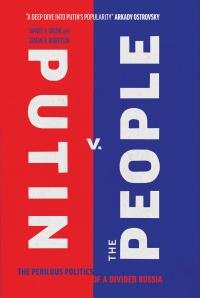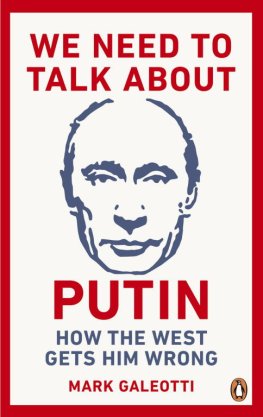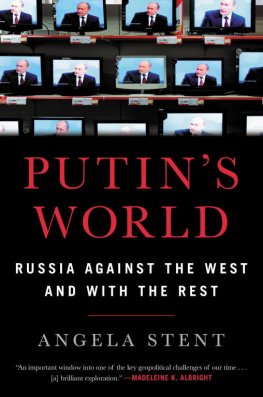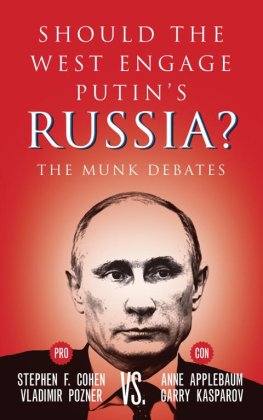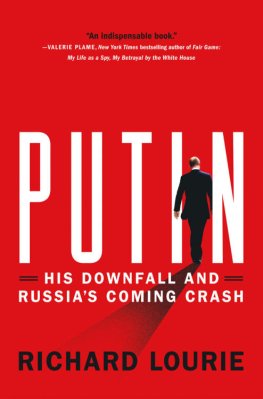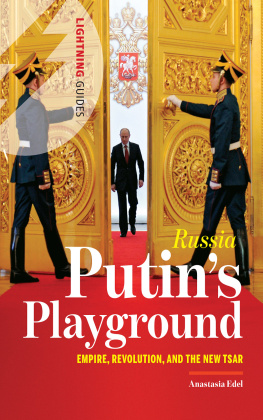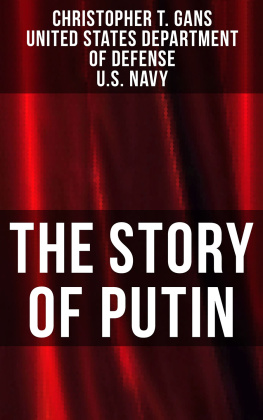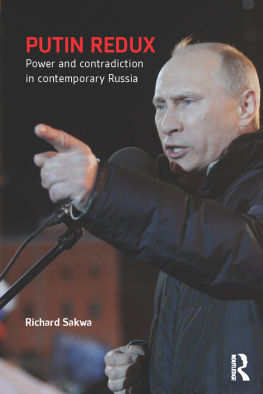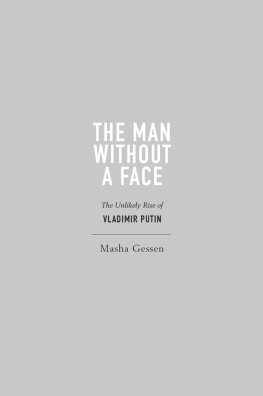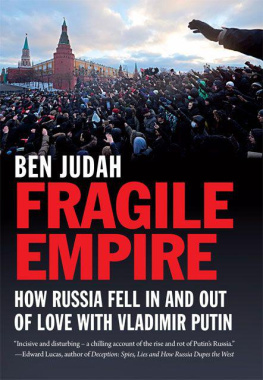Thank you for downloading this Simon & Schuster eBook.
Join our mailing list and get updates on new releases, deals, bonus content and other great books from Simon & Schuster.
C LICK H ERE T O S IGN U P
or visit us online to sign up at
eBookNews.SimonandSchuster.com
We hope you enjoyed reading this Simon & Schuster eBook.
Join our mailing list and get updates on new releases, deals, bonus content and other great books from Simon & Schuster.
C LICK H ERE T O S IGN U P
or visit us online to sign up at
eBookNews.SimonandSchuster.com
ALSO BY KAREN DAWISHA
Russia and the New States of Eurasia: The Politics of Upheaval (with Bruce Parrott)
Eastern Europe, Gorbachev, and Reform: The Great Challenge
The Kremlin and the Prague Spring
Soviet Foreign Policy towards Egypt

Simon & Schuster
1230 Avenue of the Americas
New York, NY 10020
www.SimonandSchuster.com
Copyright 2014 by Karen Dawisha
All rights reserved, including the right to reproduce this book or portions thereof in any form whatsoever. For information address Simon & Schuster Subsidiary Rights Department, 1230 Avenue of the Americas, New York, NY 10020
First Simon & Schuster hardcover edition September 2014
SIMON & SCHUSTER and colophon are registered trademarks of Simon & Schuster, Inc.
The Simon & Schuster Speakers Bureau can bring authors to your live event. For more information or to book an event contact the Simon & Schuster Speakers Bureau at 1-866-248-3049 or visit our website at www.simonspeakers.com.
Jacket design by Flag Tonuzi
Library of Congress Control Number: 2014948969
ISBN 978-1-4767-9519-5
ISBN 978-1-4767-9521-8 (ebook)
CONTENTS
To free Russian journalism
INTRODUCTION
I N REACTING to Russias annexation of Crimea and support for pro-Russian separatists in Ukraine in early 2014, the U.S. government announced an unprecedented response: not the Russian state but individual Russian citizens would be subjected to asset seizures and visa bans. The Sixth Fleet was not called into action; exports to Russia as a whole were not banned; cultural and educational exchanges were not stopped. Rather, individual elites close to a senior Russian Government officialVladimir Putinwere targeted.
Probably the most serious international crisis since the end of the Cold War, and the White House targets individuals. Why this response? Because at last, after fourteen years of dealing with President Vladimir Putin as a legitimate head of state, the U.S. government has finally acknowledged publicly what successive administrations have known privatelythat he has built a system based on massive predation on a level not seen in Russia since the tsars. Transparency International estimates the annual cost of bribery to Russia at $300 billion, roughly equal to the entire gross domestic product of Denmark, or thirty-seven times higher than the $8 billion Russia expended in 2007 on national priority projects in health, education, and agriculture.
And these billionaires, far from being titans of industry motoring the modernization of the Russian economy, have secured and increased their wealth by relying on and bolstering the centralized power of the state. The wealth of the oligarchs and political elites who came to power with Putin in 2000 has been more stable than in any other G7 country; they have made millions, though some have also lost as much. Political leaders close to Putin have become multimillionaires, and the oligarchs around them, according to Forbes Russia, have become billionaires. They are able to maintain that power and wealth as long as they dont challenge Putin politically. Under this system, the state absorbs the risk, provides state funds for investment, and gives those close to the Kremlin massive monetary rewards. With the return under Putin to state capitalism, the state nationalizes the risk but continues to privatize the rewards to those closest to the president in return for their loyalty.
Within weeks of Putins coming to power, the Kremlin began to erode the basic individual freedoms guaranteed under the 1993 Russian Constitution. This pattern of gradually closing the public space and denying citizens the rights of free press, assembly, and speech was present and planned from the very beginning, as will be shown in my discussion of a document, never before published outside Russia, detailing the plans made in late 1999 and early 2000 to reshape the entire Presidential Administration to achieve these ends. In Russia, the Presidential Administration is the true locus of power, particularly under Putins vertical of power. Its offices and departments shadow and supervise the work of the government ministries, the two houses of the legislature, the courts, regional government, the media, and societal movements like youth groups and trade unions. It is from here that policy is made in all sectors of domestic and foreign policy, to be implemented by the government or passed into law by the Duma and the Federation Council. Putin was enormously assisted by very favorable global economic conditions in which the price of oil shot up to over $140 per barrel, allowing the Kremlin to provide an increased standard of living for ordinary Russians and the emerging middle class while also creating greater social stability.
But Putin also benefited from the existence of a tight-knit circle that came with him from St. Petersburg and with whom he had worked for over a decade. In this book I lay out the case for the existence of a cabal to establish a regime that would control privatization, restrict democracy, and return Russia to Great Power (if not superpower) status. I also detail the Putin circles use of public positions for personal gain even before Putin became president in 2000. The trail leads to the establishment of Bank Rossiya, now sanctioned by the United States; the rise of the Ozero Dacha Consumer Cooperative, founded by Putin and other members now subject to visa bans and asset seizures; the links between Putin and Petromed, the medical supply company that diverted millions in state funds to build Putins Palace near Sochi; and the role of security officials from Putins KGB days in Leningrad and Dresden, many of whom have maintained their contacts with Russian organized crime.
Elections in all new democracies suffer from certain problems of weak party stability; poor, loose, and fluid electoral laws; and voter manipulation and fraud. However, these problems should decrease over time, leading to the consolidation of democratic institutions. In Russia, however, they have only increased, until in the 201112 electoral cycle the fraud and abuse were so widespread that popular demonstrations broke out. By the end of 2011, having come through a thoroughly fraudulent and publicly documented sham election for the Duma (the lower house of the Federal Assembly, Russias Parliament), it became crystal clear that the ability of activists in Moscow and St. Petersburg to seek democratic change was significantly inferior to the regimes ability to suppress change.
After Putin publicly wept, possibly from relief, when he was declared the winner of the 2012 presidential elections, increased targeted repressions began again, reminiscent of the early 1930s or the late 1960s in the USSR. Nonviolent demonstrators were once again sentenced to either prison or indefinite psychiatric treatment. With the economy suffering a downturnmainly because of elite plunderingthe crony regimes inner logic seemed clear: Putin was willing to use force to maintain his potentially indefinite hold on power so that his group could continue to loot the country without limit. In response, Russian websites held endless discussions of the reign of bespredel the limitless and total lack of accountability of the elitesunder the faade of restoring Russian greatness.
Next page

